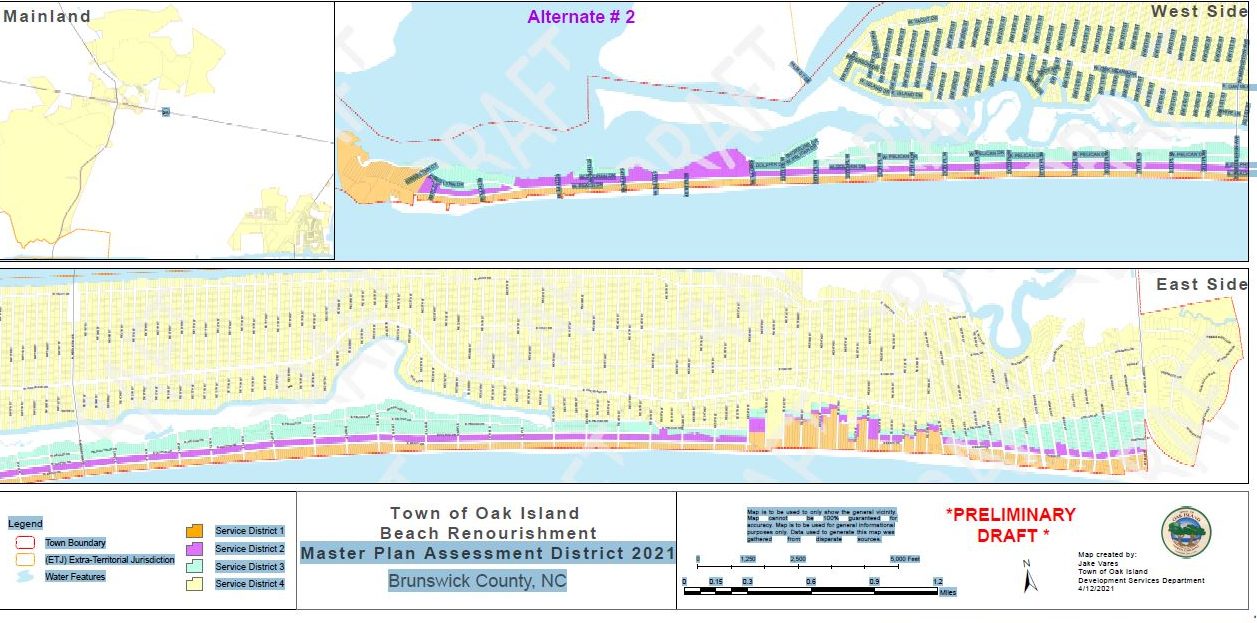
OAK ISLAND — The town council, after learning that the selected contractor was running behind schedule after starting two months later than expected on the beach nourishment project underway here, has decided to wait until early next year to set special assessments on property to fund its beach nourishment master plan.
The town council had previously approved a map that set the boundaries for four “benefit zones” for assessments to fund the master plan for beach nourishment. The special meeting held Thursday was to discuss the rates for each of the assessment zones.
Supporter Spotlight
Town Manager David Kelly explained during the meeting that Great Lakes Dredge and Dock Co. initially said they’d begin work in February. The project is being funded by the Federal Emergency Management Agency’s Hurricane Matthew recovery fund. Instead, the company took on a project at Bald Head Island between being awarded the Oak Island project and beginning work here.
The Bald Head Island project took two months longer than planned and Great Lakes didn’t begin work at Oak Island until April 8.
Because of the delay, officials are worried that the work won’t be finished before the environmental window for dredging closes at the end of the month, Kelly said. The project would have to be finished in the fall when the window dictated by sea turtle nesting season reopens.
This sets up a domino effect, possibly pushing back the end of the first FEMA project to the fall when the second should be starting, Kelly said.
The current, or 2020-21, project being paid for by FEMA’s Hurricane Matthew recovery fund is to build a dune designed to withstand the intensity of a storm seen once in a 25-year period, from SE 63rd Street to Middleton Avenue. The second FEMA project will use federal Hurricane Florence recovery funds to build a similar dune on different stretch of beach.
Supporter Spotlight
Kelly said the second FEMA project should be going out for bid in June and July, and starting in November.
“But what Great Lakes has done to us if they do not finish, that puts them coming back in November, December, and not completing the project until January,” he said. “What that does is push our second FEMA project back. So, we’d be in the same predicament that we’re sitting here now wondering if they’re going to be able to get the product onto the beach and finish the project.”
Kelly added that Great Lakes put the town in a situation “where we don’t really have too much of a choice on delaying other items because of the hardship they put us in currently. So with all that said, I believe at this time we need to put off the assessments until January, look at the numbers that we obtain over the next six months and then reevaluate the cost.”
The assessment option was chosen to provide the estimated $40 million needed to fund future nourishment efforts anticipated within the master plan, a long-term approach to beach preservation and nourishment. The town said that a goal is to get FEMA recognition as an “engineered beach,” which could potentially provide ongoing funding for storm recovery and help ensure more consistent federal recovery funding, as previously reported.
The council opted for the service districts in what officials described as an effort to be equitable with rates proportional to the amount of direct benefit received, such as a property’s proximity to the oceanfront, according to the town.
Coastal Review made several attempts to reach Great Lakes for comment.







